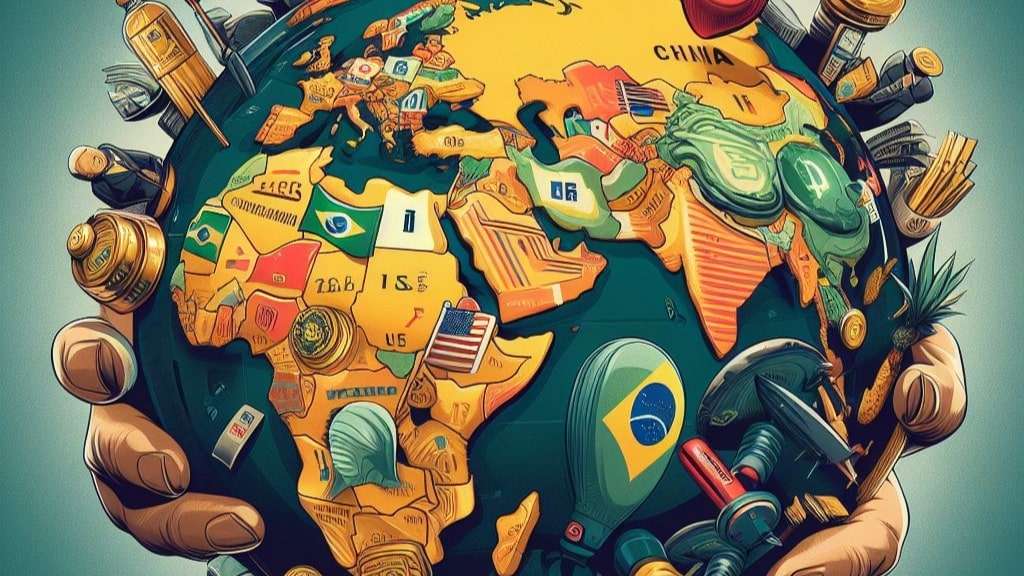
In a significant development on the global economic stage, the BRICS alliance, comprising Brazil, Russia, India, China, and South Africa, is undergoing a strategic shift in their investment portfolios. Over the past month, these countries, including China, have collectively divested $18.9 billion from U.S. Treasury bonds, marking a departure from their traditional investment strategies. This move has raised questions about the implications for the global financial landscape and the role of the U.S. dollar as the world’s reserve currency.
China’s Prudent Reduction
China, the world’s second-largest holder of U.S. treasuries, made a noteworthy reduction in its holdings, with a decrease of $13.6 billion from June to July. Over the past year, China has offloaded approximately $117.4 billion worth of U.S. government debt. This strategic maneuver is believed to be an attempt to defend the value of the Chinese yuan against a strengthening U.S. dollar. The yuan recently reached $0.136 against the U.S. dollar, a level not seen since January 2008. Selling U.S. treasuries provides capital for China’s central bank to accumulate local currency, thereby boosting its value.
BRICS Members Following Suit
China’s actions have not gone unnoticed within the BRICS alliance. Brazil, another significant member, has also reduced its U.S. treasury holdings by approximately $2.7 billion, going from $227.4 billion in June to $224.7 billion in July. Similarly, India has trimmed its holdings by $2.3 billion over the same period. Even the United Arab Emirates, while not a BRICS member, witnessed a decline in its U.S. treasury holdings, dropping by $300 million from June to July, totaling $64.9 billion.
Diversification as a Defensive Strategy
This strategic shift by BRICS nations goes beyond mere financial maneuvering; it holds profound geopolitical and economic implications. The BRICS nations are increasingly diversifying their investment portfolios, possibly as a safeguard against the potential impacts of U.S. economic policies. The diminishing U.S. treasury holdings of these nations could also have far-reaching consequences for the U.S. government’s ability to finance its debt, raising questions about the long-standing role of the U.S. dollar as the world’s reserve currency.
However, it’s essential to contextualize these developments within the broader global economic landscape. Various factors, including trade tensions, geopolitical realignments, and the ongoing effects of the COVID-19 pandemic, are contributing to this shift in investment strategies.
Geopolitical Ramifications
The decision by BRICS nations to divest from U.S. treasuries holds geopolitical significance. It underscores their desire to reduce dependency on the U.S. dollar, potentially weakening U.S. influence in global finance. Furthermore, this reallocation of investments may also be seen as a statement of autonomy, asserting their economic prowess on the world stage.
Economic Implications
When BRICS countries sell U.S. treasuries, the proceeds often serve as capital for their central banks to acquire local currency, bolstering its value. This can have a stabilizing effect on their respective economies and exchange rates. However, the reduced demand for U.S. treasuries may lead to higher yields on these bonds, affecting interest rates and the cost of borrowing in the United States.
The Future of Global Finance
The shedding of U.S. treasuries by BRICS nations could be a harbinger of more significant economic changes to come. As these nations diversify their investments, they may seek alternatives to the U.S. dollar, potentially leading to the development of new global financial instruments and alliances. This could reshape the landscape of international finance in the years ahead.
A Complex Web of Factors
It’s crucial to recognize that these strategic moves occur against the backdrop of a rapidly evolving global economy. Trade tensions between major economies, geopolitical realignments, and the persistent effects of the COVID-19 pandemic have all played a role in shaping these decisions. As the world grapples with these multifaceted challenges, nations are reassessing their financial strategies to secure their economic interests.
In conclusion, the recent shift in investments by BRICS nations away from U.S. Treasury bonds signifies a significant transformation in the global economic landscape. While these developments may have immediate implications for financial markets and exchange rates, they also signal a broader reevaluation of the world’s economic order. As these nations diversify their portfolios and explore alternative financial avenues, the future of global finance appears to be entering a new and unpredictable phase.


Get the latest Crypto & Blockchain News in your inbox.